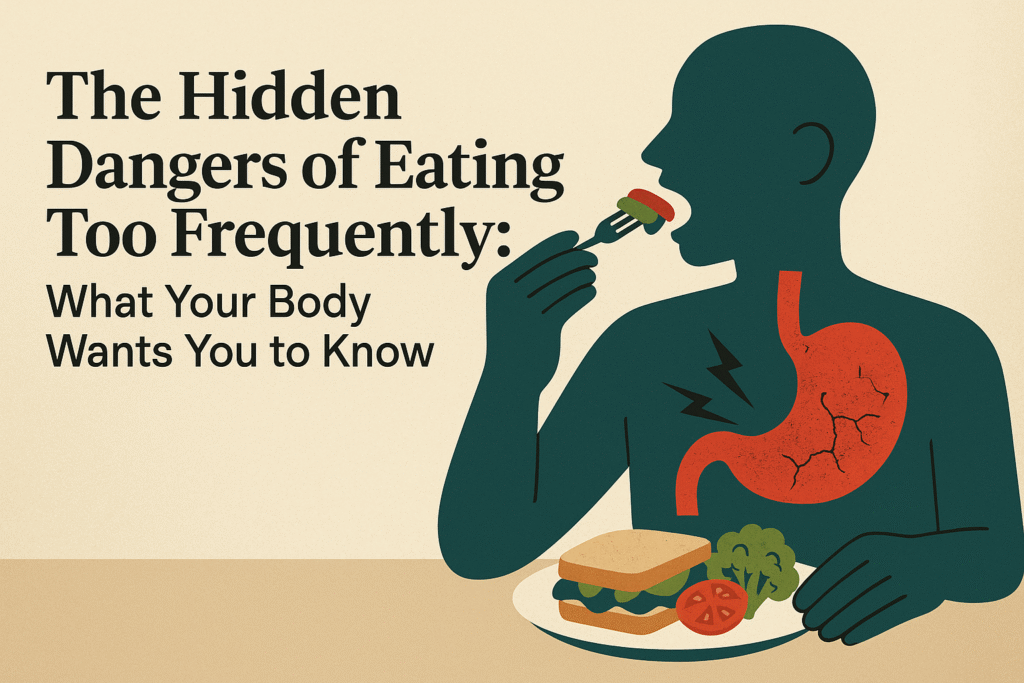
The Hidden Dangers of Eating Too Frequently: What Your Body Wants You to Know
In our wellness-focused culture, there’s a growing emphasis on eating small, frequent meals to “boost metabolism,” “balance blood sugar,” and “prevent overeating.” While this advice may work in some specific health conditions, eating frequently throughout the day can backfire — doing more harm than good when done without awareness.
This article explores the hidden harms of constant eating, what affects your digestive/metabolic systems, and what your body truly needs to function optimally.
What Does “Eating Too Frequently” Really Mean?
Eating too frequently refers to consuming food/snacks multiple times a day, sometimes every 1–2 hours, without sufficient time between meals for proper digestion/metabolism rest.
Examples include:
- Constant grazing on snacks between meals
- Drinking calorie-dense beverages (milk tea, juice, sugary coffee) repeatedly
- Eating out of boredom or stress, not hunger
- Using “six small meals a day” without portion control or structure
While this pattern may seem harmless—or even healthy—it can disrupt the body’s natural rhythms and long-term health.
Why Your Body Needs Time Between Meals
The human digestive system is not designed to work non-stop. After eating, your body requires 3–5 hours (sometimes more) to fully digest and process nutrients. If you eat too frequently:
- The stomach doesn’t fully empty
- The gut doesn’t reset properly
- Insulin remains chronically elevated
- The body misses out on important processes like fat burning and cellular repair
The Hidden Health Risks of Eating Too Often
- Disrupted Insulin Function and Increased Fat Storage
When you eat often, your pancreas must produce insulin repeatedly to handle the incoming glucose. Over time, this can cause insulin resistance, leading to weight gain, prediabetes, and type 2 diabetes.
Note: Constant insulin spikes prevent fat burning and encourage fat storage, especially around the abdomen.
- Poor Digestion and Gut Stress
Frequent eating doesn’t give your digestive tract enough rest. It interrupts the Migrating Motor Complex (MMC)—a cleansing wave that removes undigested food and debris from the intestine.
This can lead to:
- Bloating
- Gas
- Slow digestion
- Increased risk of SIBO (Small Intestinal Bacterial Overgrowth)
- Metabolic Slowdown
Contrary to popular belief, eating all the time doesn’t necessarily boost metabolism. In fact, it can:
- Impair fat oxidation (fat burning)
- Lead to energy crashes
- Contribute to chronic fatigue
Your metabolism benefits more from periods of fasting or digestive rest between meals.
- Loss of Hunger Awareness
When you eat out of routine or habit, not true hunger, you gradually lose touch with your body’s natural signals. This can lead to:
- Overeating
- Emotional eating
- Disrupted meal timing and satiety
- Increased Risk of Inflammation
Frequent eating—especially of processed snacks and high-sugar items—keeps inflammatory markers elevated. Over time, this contributes to:
- Joint pain
- Brain fog
- Heart disease risk
- Weakened immune response
What Your Body Actually Wants: The Case for Structured Eating
Your body thrives on balance, not constant input. Giving time between meals allows for:
- Insulin regulation and better blood sugar control
- Hormonal harmony, including ghrelin (hunger hormone) and leptin (satiety hormone)
- Improved digestive performance
- Fat burning during fasting windows
- Autophagy, a natural process of cellular cleanup and renewal
Healthy Eating Pattern Suggestions
If you suspect you’re eating too often, here’s how to transition toward a healthier rhythm:

Let your body get fully hungry before eating again.

Instead, focus on nutrient-dense meals that keep you full.

Often, thirst is mistaken for hunger.

Include protein, healthy fats, fiber, and complex carbs to support satiety and energy.

Eat when you’re genuinely hungry—not out of habit, boredom, or emotion.
Scientific Research Supporting the Risks of Frequent Eating

A study in the Journal of Clinical Endocrinology & Metabolism (2016) found that frequent eating causes insulin levels to rise, and over time that may lead to more fat storage and insulin resistance.
Reference: Leidy HJ, et al. (2016). The Role of Eating Frequency and Timing in Health. J Clin Endocrinol Metab.

Research from the American Journal of Physiology shows that constant eating interrupts the MMC, leading to impaired gut motility and microbial imbalance.
Reference: Vantrappen G, et al. (1979). The Migrating Motor Complex: Control Mechanism and Clinical Implications. Am J Physiol.

A meta-analysis in the British Journal of Nutrition (2014) reported no consistent benefit to eating more frequently, and some studies showed higher body mass index (BMI) in frequent eaters.
Reference: Schoenfeld, B. J., Aragon, A. A., & Krieger, J. W. (2014). A meta-analysis examining the impact of meal frequency on weight reduction and body composition. British Journal of Nutrition, 111(3), 381–386
